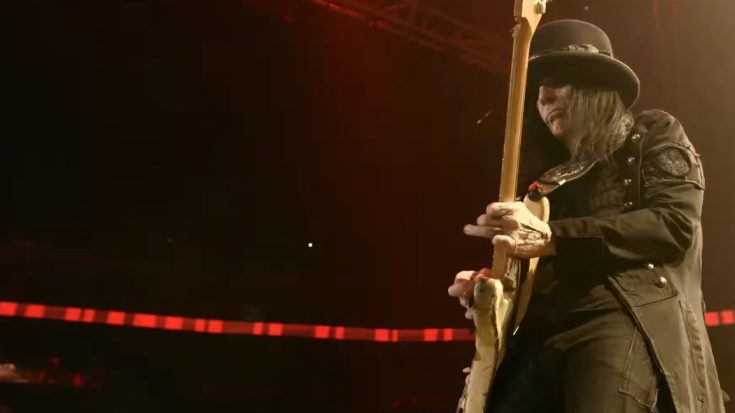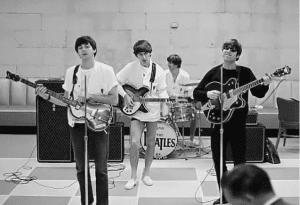Mick Mars Reacts Being Labeled An Underrated Guitarist

Mick Mars and Motley Crue live in 2015 - Eagle Rock / Youtube
For decades, Mick Mars’ searing riffs and bluesy licks fueled Mötley Crüe’s anthems, propelling them to rock royalty status. Yet, a lingering question remains: is he an underappreciated guitar hero?
In a recent interview, Detroit’s WRIF host Meltdown ignited the debate, declaring Mars “one of the most underrated players of the 80s”. But how does the man himself react to this label?
Mars, ever the unassuming musician, shrugs it off with a cool, “Well, that’s okay”. He acknowledged the diverse opinions, noting, “There’s a lot of people who think like you, as well [as those who don’t feel that way] so much.”
But what might fuel this “underrated” narrative? Could it be his distinct style, prioritizing feel and groove over technical acrobatics? Mars hinted at this, questioning, “Maybe because I don’t fly over the frets and do 900—how many notes can I fit between the clicks? I don’t know.”
Mick Mars’ work on “Home Sweet Home” was “the perfect guitar solo”
Continuing the conversation, Mars acknowledges a guitarist who pushed the boundaries of speed: “Alvin Lee [of Ten Years After] when he did “I’m Going Home”.”
He went on, “That, to me, was fast playing, ’cause it was melodic and the notes were clean, and it fit the song. And so, that was where my face went, like, ‘Oh, you can do that too? Okay’.”
Meltdown then throws him a curveball, calling the solo in Mötley Crüe’s “Home Sweet Home” “the perfect guitar solo”. Mars replied, “Oh, thank you. That just came up. I didn’t really have anything planned. I just winged it, actually, and just played it and perfected it, of course. It was real minor things, but it is what it was when I played it. It’s pretty much how it is.”
These two contrasting statements highlight Mars’ unique approach. He admires technical prowess but prioritizes melody and song service. And while he downplays his own solo, his “just played it” attitude speaks volumes about his natural talent and ability to create iconic moments.
“I’d do a part, they’d erase it”
Mars, currently embroiled in a legal battle with his Mötley Crüe bandmates, recently revealed a deeper rift in their final years. In a Rolling Stone interview, he confessed to minimal involvement in their last three albums, citing frustrations with both his musical contributions and creative exclusion.
Regarding Generation Swine (1997), Mars claimed, “I don’t think there’s one note that I played [on it].” He described the band prioritizing synthesized guitar sounds, leaving him feeling marginalized. “I’d do a part, they’d erase it, and somebody else would come in and play,” he lamented.
The situation reportedly didn’t improve with New Tattoo (2000). Mars stated, “I didn’t write any of those songs, since I wasn’t invited.”
He claimed only one guitar lick from him made it onto the entire album. These revelations highlight a stark contrast between the guitarist’s iconic past and his perceived marginalization in later Mötley Crüe years.
Mars has also minimal contribution in his final Mötley Crue album
Mick Mars’ involvement in his last Mötley Crüe album, Saints of Los Angeles, has also become a point of contention. While Mars claims minimal contribution, bassist Nikki Sixx painted a different picture.
According to Sixx, Mars played “lead guitar, rhythm guitar, and any other guitar” on the album. However, reports contradicted this, attributing most of the guitar work to former Guns N’ Roses guitarist D.J. Ashba, who also collaborated with Sixx in their side project Sixx:A.M.
Sixx acknowledged Mars’ challenges, stating, “Mick was struggling to play his parts.” He described a blend of Ashba and Mars’ work, prioritizing the latter when possible, “unless, of course, he couldn’t play his parts or remember his parts.”
This conflicting narrative leaves the true extent of Mars’ involvement in Saints of Los Angeles shrouded in ambiguity. Did he contribute significantly, or did Ashba take the reins when needed? The answer might depend on who you ask, adding another layer to the complex history of Mötley Crüe.
A lawsuit following his retirement from touring
Mick Mars announced his retirement from touring in 2022 due to ongoing health concerns. While he initially insisted on staying a band member with John 5 filling his touring shoes, things took a dramatic turn.
Mars took matters to court, filing a lawsuit against his former bandmates in Los Angeles Superior Court.
His claim paints a stark picture: the remaining members allegedly attempted to oust him as a major stakeholder in the band’s business ventures following his retirement announcement. This maneuver, he contends, happened through a secretive shareholders’ meeting.
Mars, whose real name is Robert Alan Deal, has been the man behind the riffs that propelled Mötley Crüe to rockstardom since their 1981 debut.
https://twitter.com/fiona_gl13/status/1700148653053104636
Mick Mars’ The Other Side Of Mars
On February 23rd, Mars would embark on a new sonic journey with his debut solo album, The Other Side Of Mars. Released through his own label, 1313 LLC, in collaboration with MRI, this album promises a fresh perspective outside of Mötley Crüe.
Joining Mars on this venture is Alabama-based powerhouse Jacob Bunton. A seasoned collaborator with rock royalty like Steven Adler (Guns N’ Roses) and Tom Keifer (Cinderella), Bunton brings his songwriting talents and vocal presence to all but two tracks on the album.
But the guest list doesn’t stop there. Adding diverse layers to the sound are Paul Taylor (keyboardist for Winger and Alice Cooper), Ray Luzier (drummer for Korn), and Brion Gamboa, who takes the lead on “Undone” and “Killing Breed”.
Previously the frontman for Alabama bands Mars Electric and Lynam, Bunton joins forces with Mars to create a unique listening experience.











